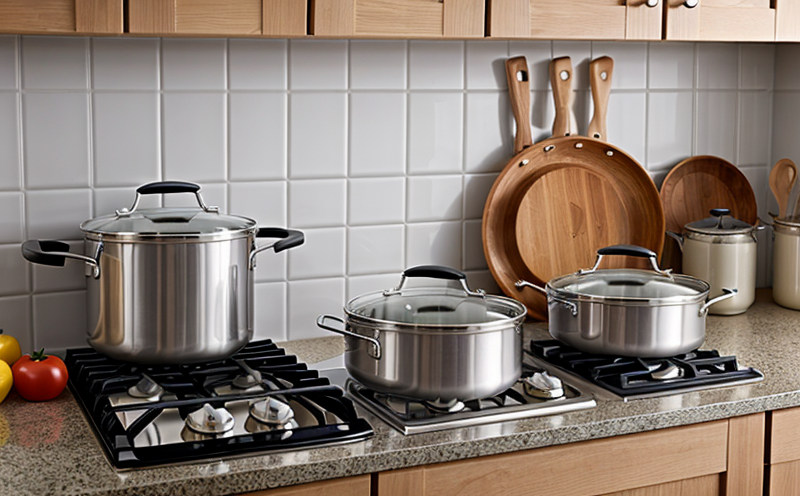Gas Stove Safety Testing of Pots and Pans
The safety testing of pots and pans used on gas stoves is a critical aspect in ensuring consumer protection. This test evaluates the compatibility and performance of cookware when heated to high temperatures, which can generate significant heat and flames. The purpose of such tests is to prevent accidents that could lead to fires or burns in the kitchen.
The primary focus during these tests includes assessing the stability, thermal shock resistance, and durability of pots and pans under extreme conditions. Stability testing ensures that cookware does not tip over when placed on a gas stove. Thermal shock resistance checks how well materials withstand sudden changes in temperature without cracking or breaking. Durability assessments determine if the products can withstand repeated use without significant wear and tear.
The testing process begins with selecting appropriate samples of pots and pans based on their intended use. Specimen preparation involves cleaning them thoroughly to ensure accuracy during testing. The instrumentation used includes high-temperature ovens, flame simulators, and force measurement devices for stability checks. During the tests, samples are subjected to various conditions that replicate real-world usage scenarios.
The results of these tests provide valuable insights into the safety and performance of pots and pans on gas stoves. Compliance officers can use this information to ensure their products meet regulatory standards. Quality managers benefit from understanding potential weaknesses in design or manufacturing processes, allowing for improvements before product launch. R&D engineers gain knowledge about material properties and performance under stress conditions, facilitating innovation.
For procurement teams, knowing the results of these tests helps them choose suppliers who prioritize safety and quality. By integrating test outcomes into purchasing decisions, organizations can enhance overall product reliability and customer satisfaction.
Why It Matters
The importance of gas stove safety testing cannot be overstated as it directly impacts public health and safety. According to the Consumer Product Safety Commission (CPSC), cooking-related incidents are among the leading causes of home fires in many countries worldwide. Ensuring that pots and pans used on gas stoves meet strict safety standards can significantly reduce these risks.
One significant concern during gas stove use is the risk of tipping over, which could lead to burns or even larger fires if not addressed promptly. Stability testing helps identify designs prone to tipping under certain conditions, allowing manufacturers to make necessary adjustments before market release. Similarly, thermal shock resistance tests highlight materials susceptible to cracking due to rapid heating and cooling cycles, prompting changes in formulation or manufacturing techniques.
Durability assessments provide crucial data on how long a product will last with regular use. This information is essential for setting appropriate warranty periods and informing customers about expected longevity. Additionally, it aids manufacturers in identifying areas where improvements can be made to extend product life without compromising safety features.
In summary, comprehensive gas stove safety testing ensures that pots and pans contribute positively towards creating safer home environments by preventing accidents caused by improper design or substandard materials.
Eurolab Advantages
At Eurolab, our expertise in consumer products and product safety testing sets us apart as leaders in this field. With years of experience, we offer unparalleled knowledge and skills tailored specifically to meet the stringent requirements of gas stove safety testing.
We employ state-of-the-art equipment that ensures precise and accurate measurements throughout all stages of the testing process. Our highly trained professionals are committed to providing reliable data based on international standards such as ISO 9001, EN 45011, and ASTM F2637.
Our commitment extends beyond just performing tests; we also provide detailed reports that explain our findings comprehensively. These documents serve not only compliance purposes but also offer valuable insights into how products perform under various conditions. By leveraging this information, manufacturers can continuously improve their offerings while maintaining high standards of quality and safety.
Quality and Reliability Assurance
At Eurolab, we understand the importance of delivering consistent and reliable results across all our services, including gas stove safety testing. Our rigorous quality assurance processes ensure that every test conducted meets international standards and exceeds expectations.
We maintain strict adherence to ISO 9001:2015 certification, which guarantees a systematic approach to managing business processes effectively. This includes continuous improvement initiatives aimed at enhancing efficiency and effectiveness within our organization. By doing so, we can consistently deliver accurate and trustworthy results that instill confidence among our clients.
Our laboratory adheres to EN 45011 accreditation standards, ensuring impartiality and competence in conducting independent assessments. This commitment fosters trust between us and our customers by demonstrating our ability to provide unbiased evaluations free from conflicts of interest.
In addition to these certifications, we employ advanced technologies and methodologies that allow for precise measurements during testing procedures. Our experienced staff members are well-versed in using cutting-edge equipment like high-temperature ovens, flame simulators, and force measurement devices to achieve accurate results consistently.





